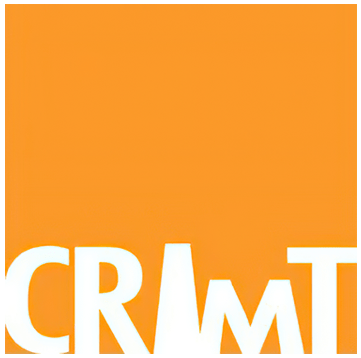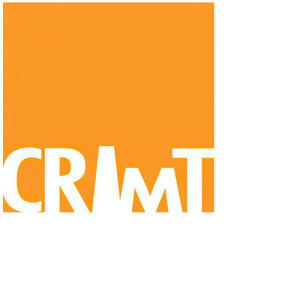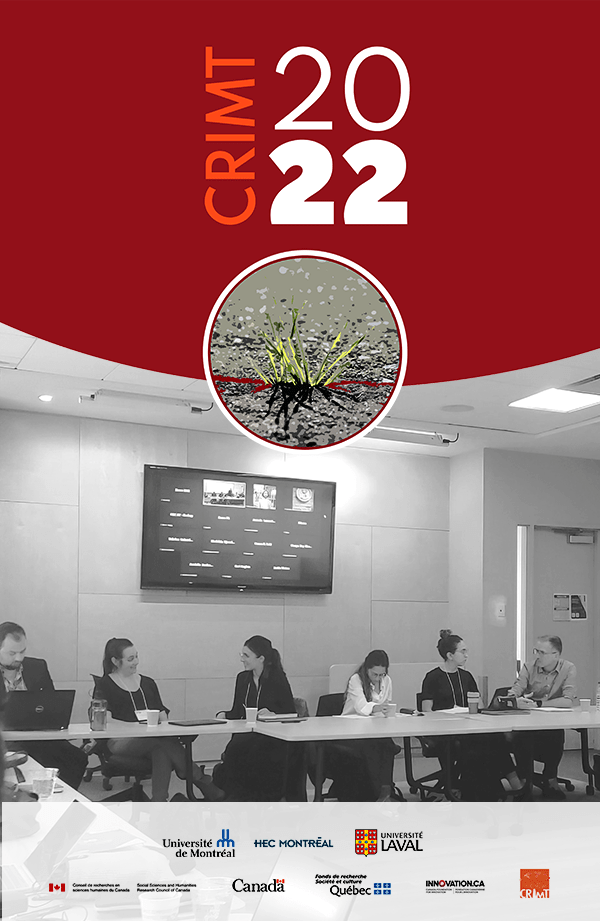
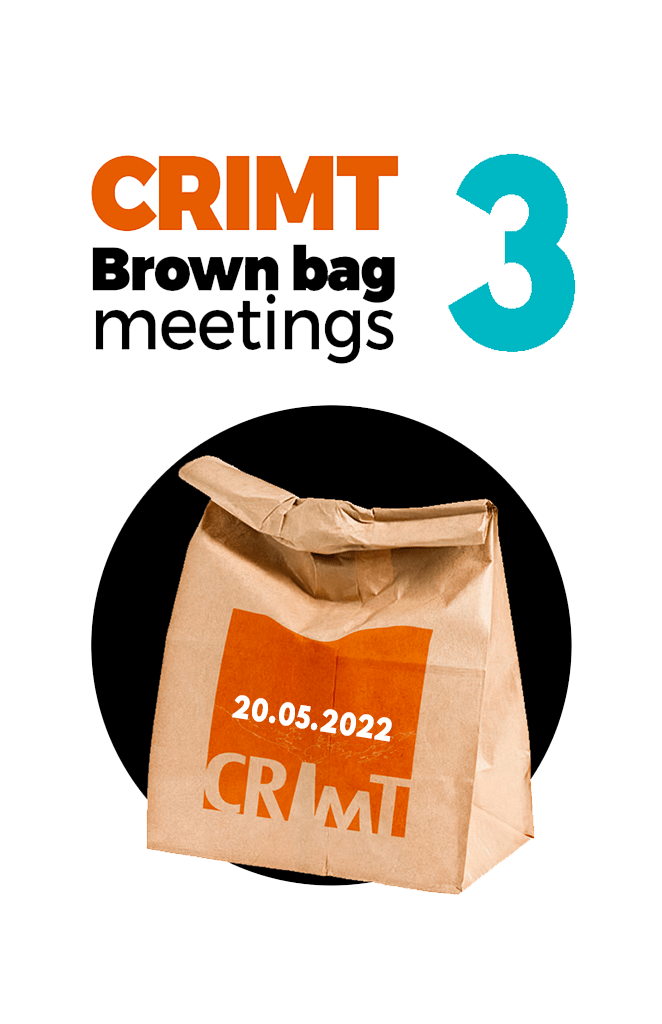
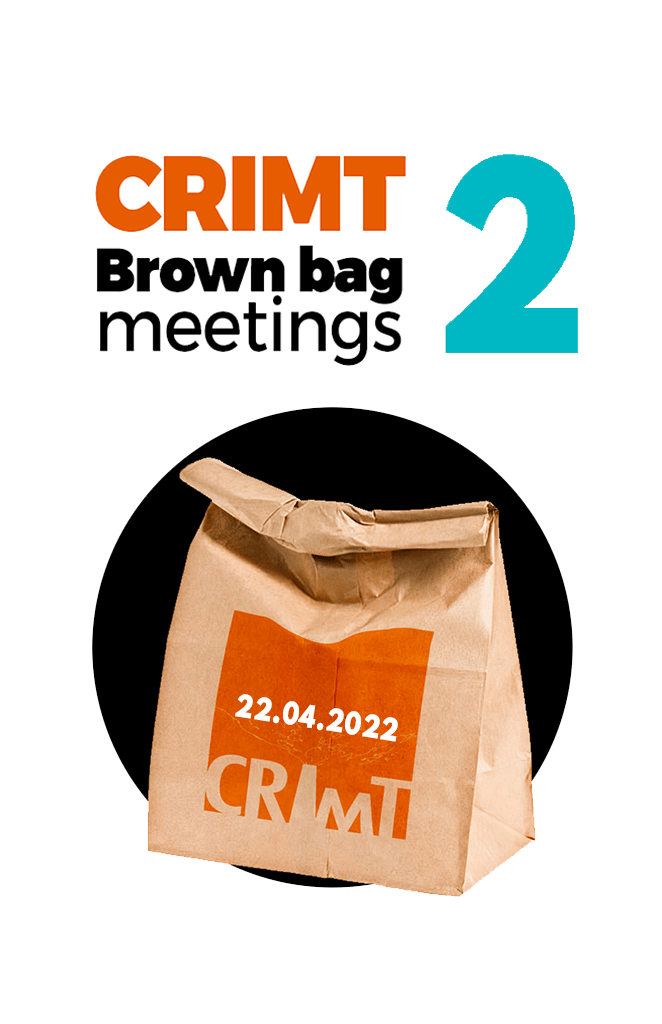

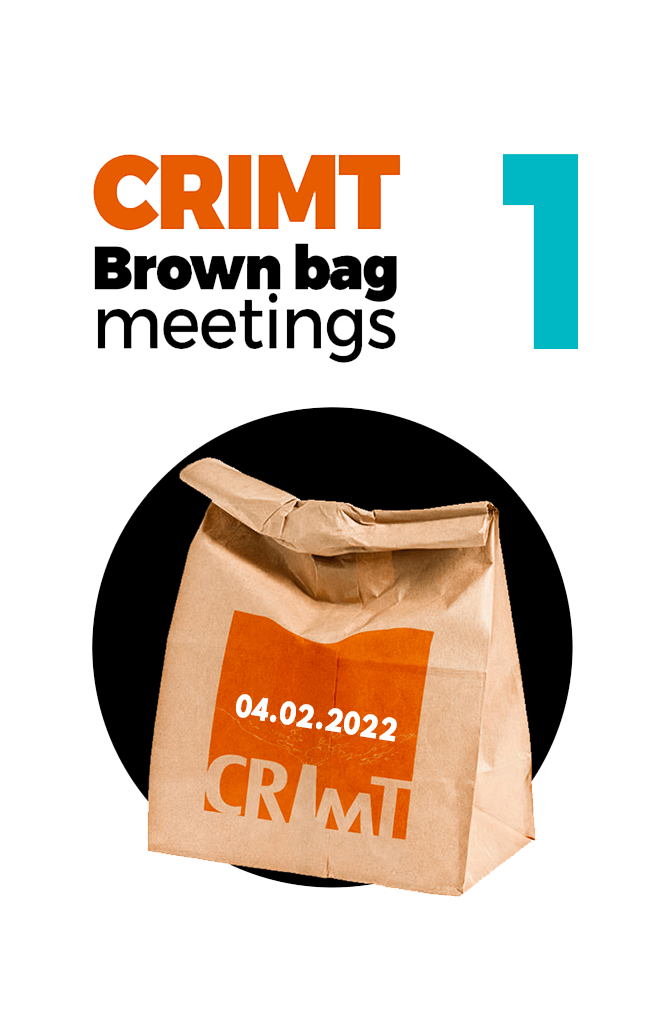
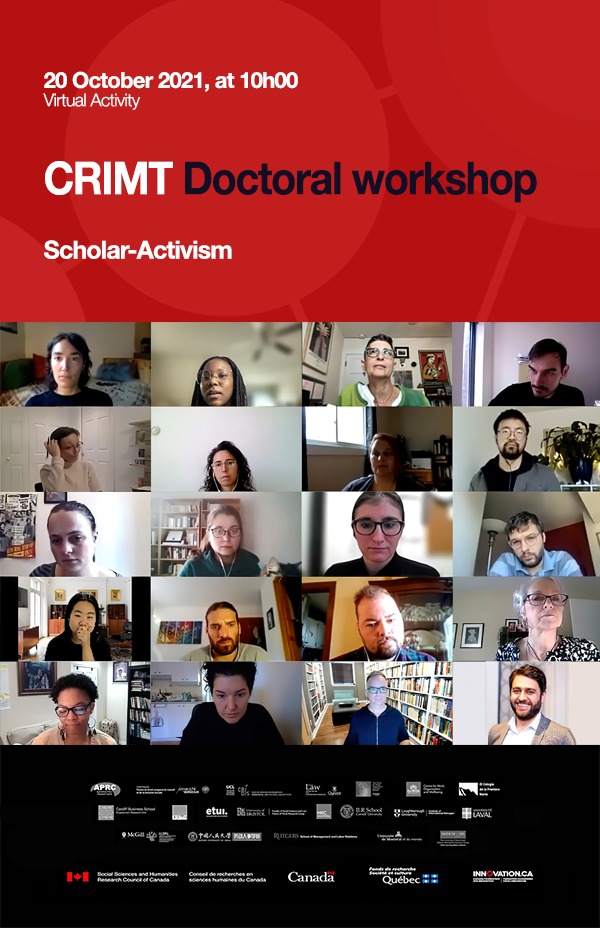
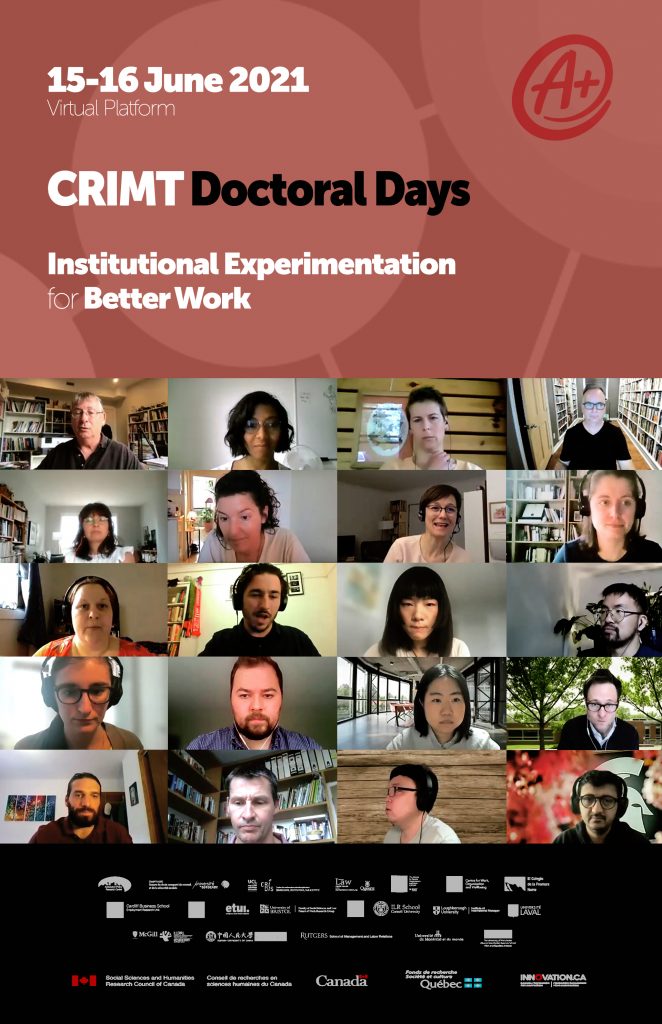
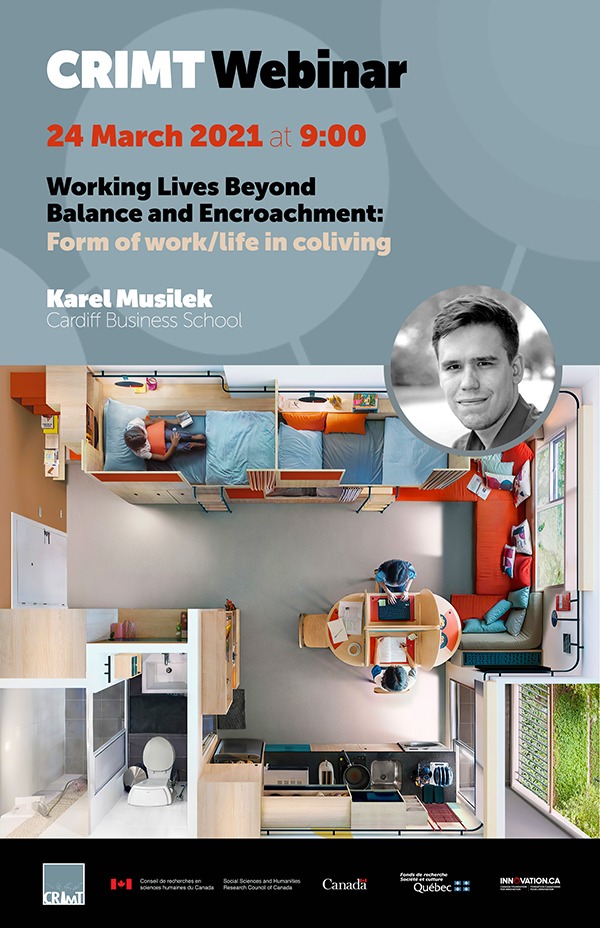

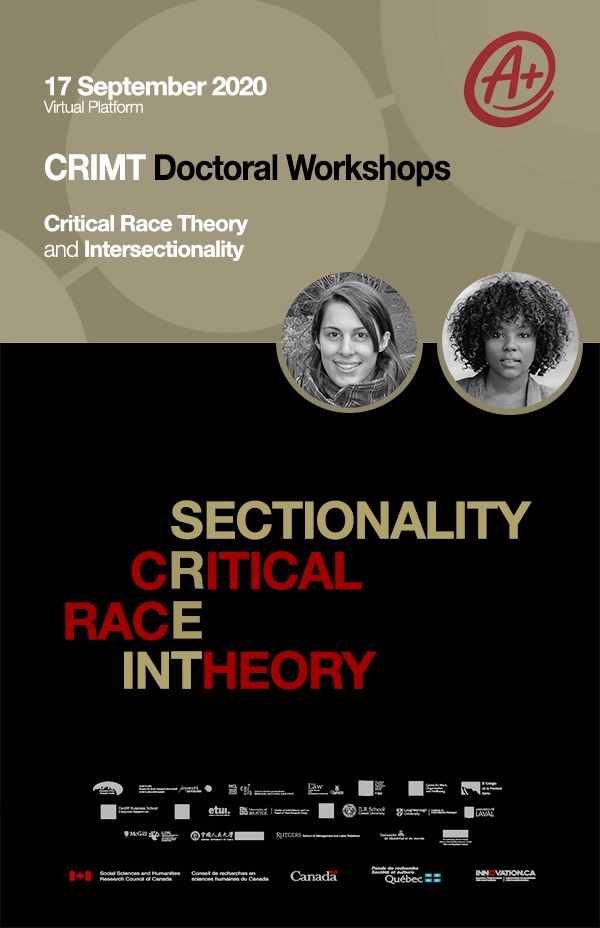
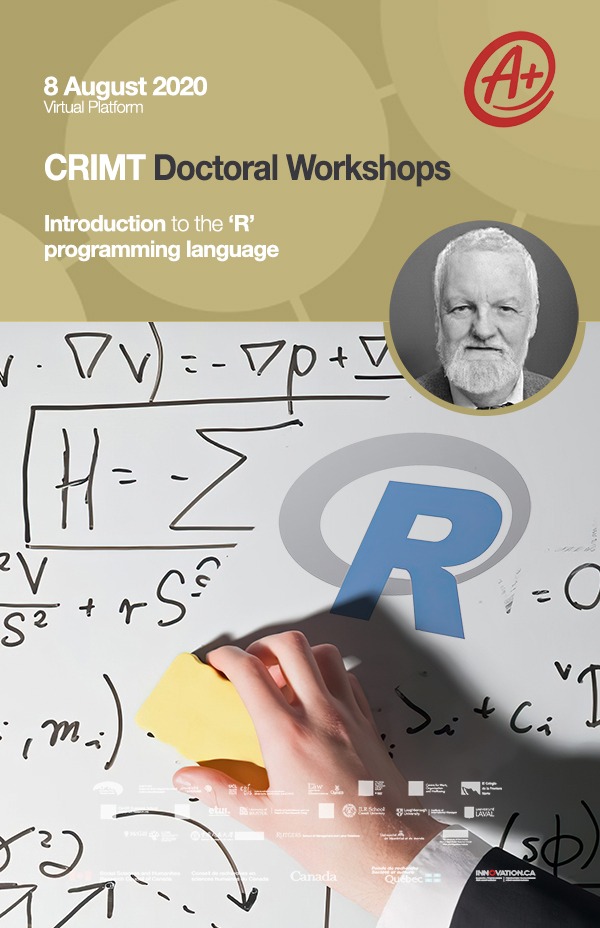
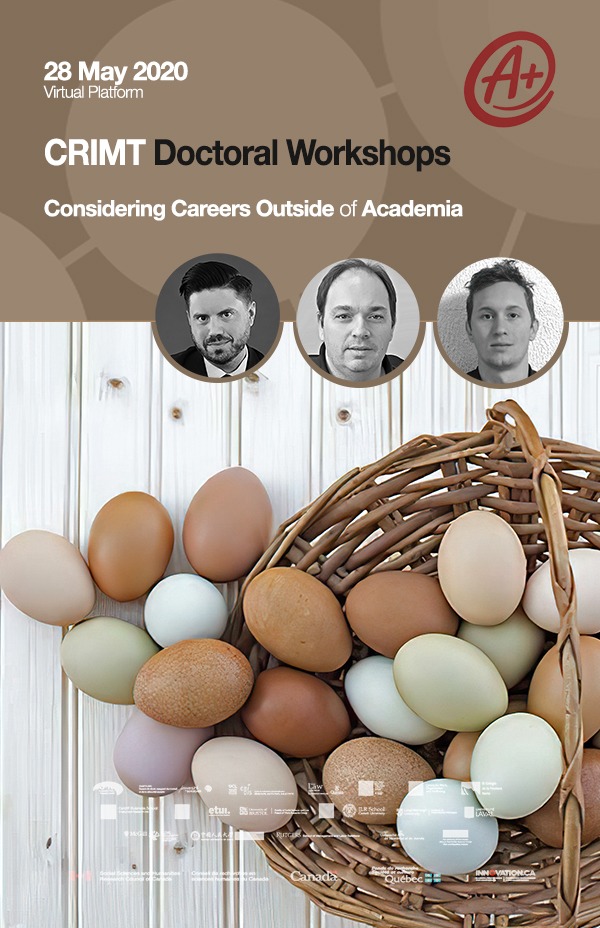
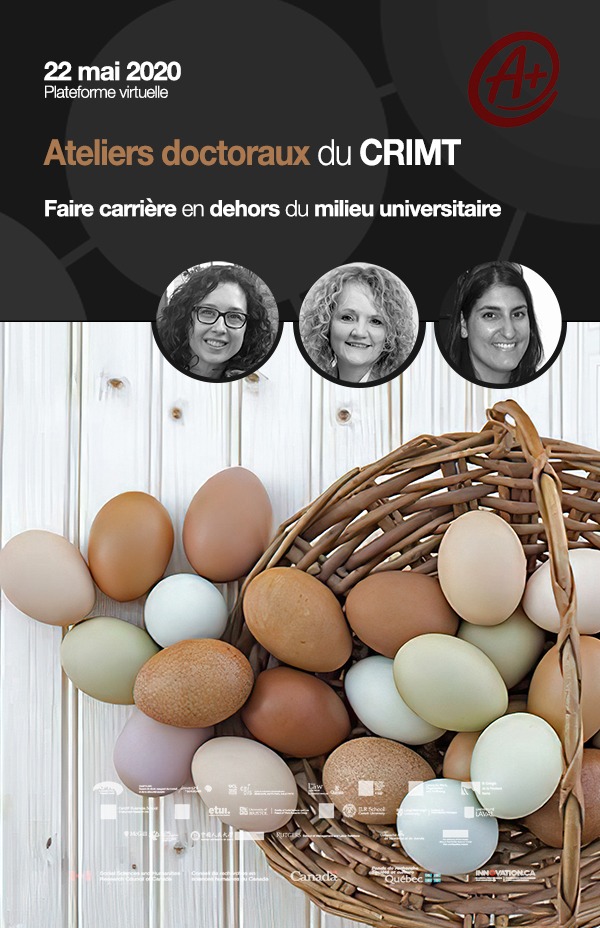
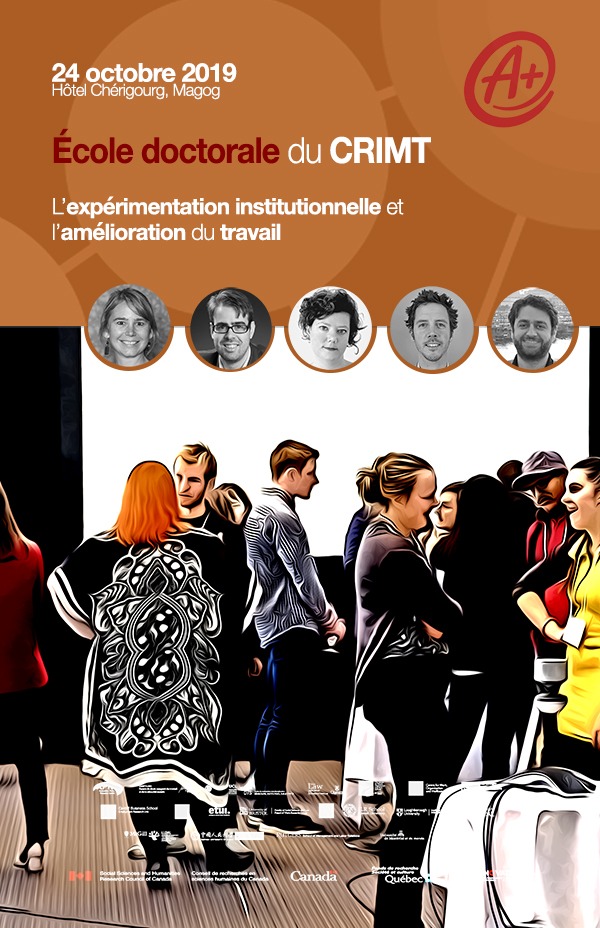
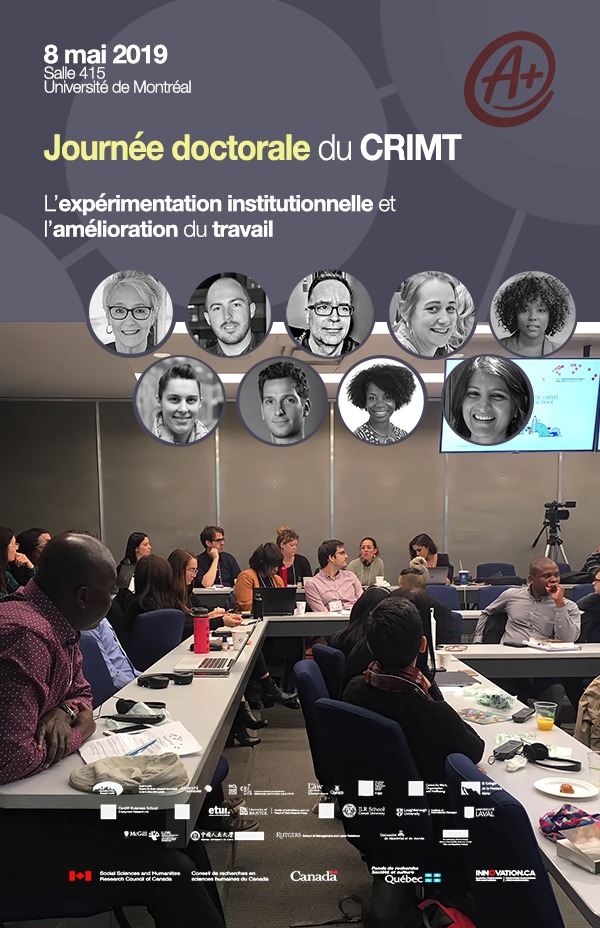
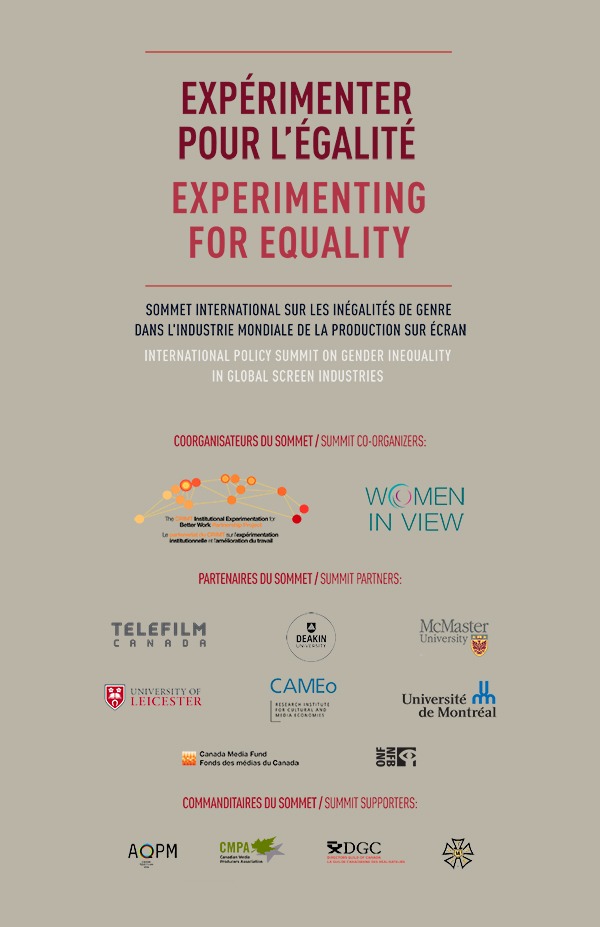
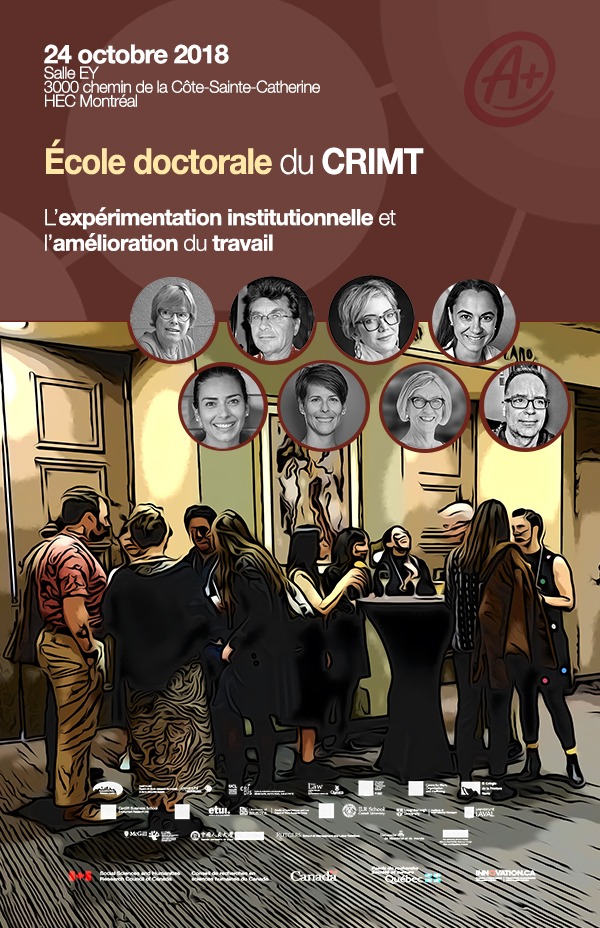
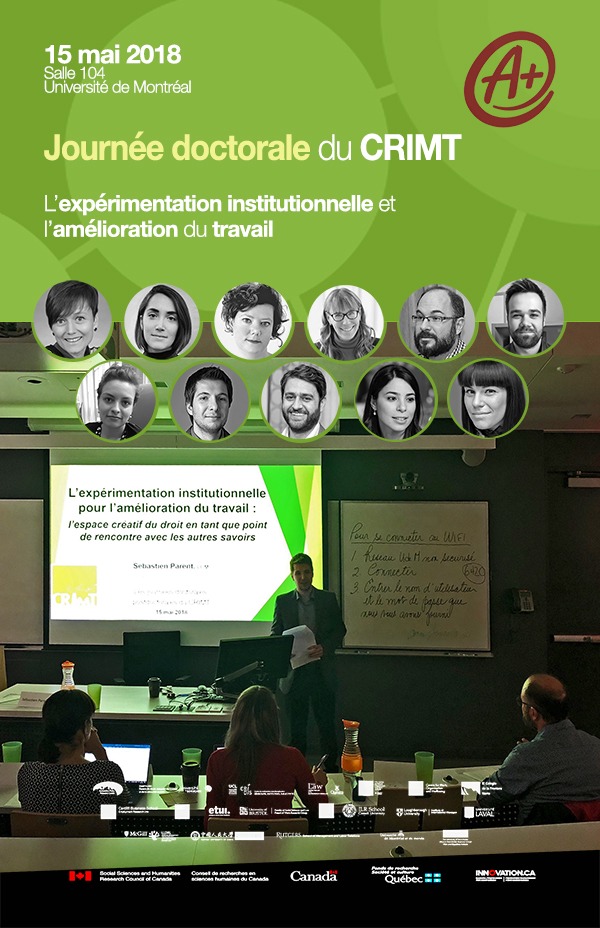
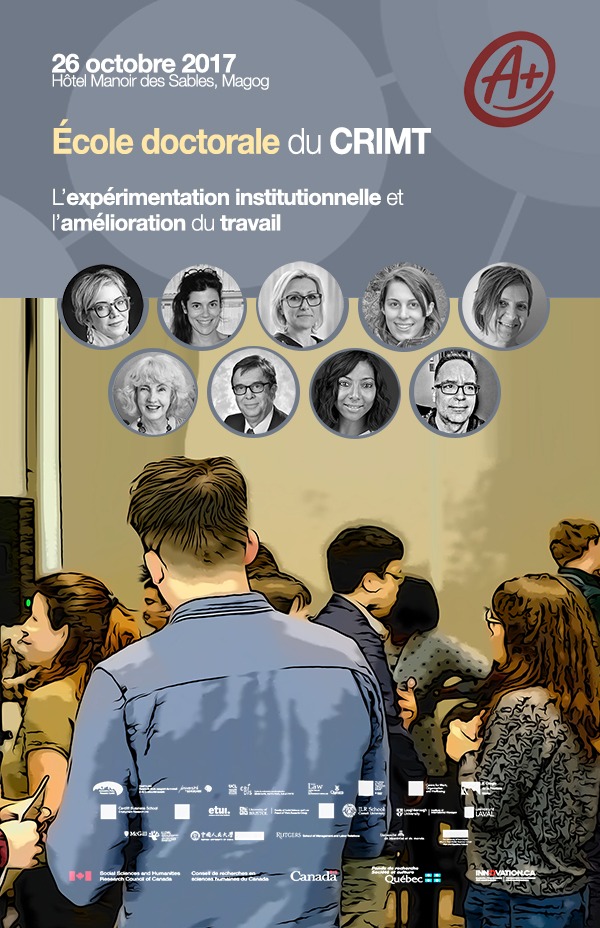
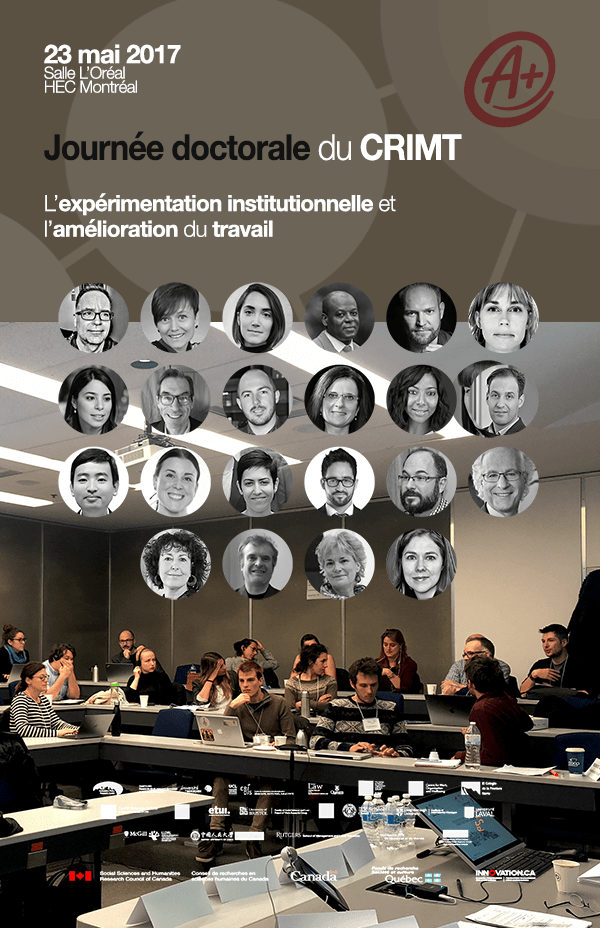

26 October 2022
Nicolas Roby (Université de Montréal), Eva Herman (University of Manchester), Justin Vinton (Rutgers University), Amanda Coles (Deakin University), Mathieu Dupuis (Université Laval), Dalia Gesualdi-Fecteau (UQAM), Mat Johnson (University of Manchester), Isabelle Martin (Université de Montréal), Georgina Murray (Griffith University), Isabelle Roberge-Maltais (HEC Montréal), David Peetz (Griffith University), Shelagh Campbell (University of Regina), Geneviève Richard (UQAM), Sean O’Brady (McMaster University), Sara Perez-Lauzon (HEC Montréal), Sébastien Parent (Université Laval), Jake Barnes (Rutgers University), Jiyoon Park (Rutgers University), Tobias Schulze-Cleven (Rutgers University), Alysa Sloan Hannon (Rutgers University), Seonghoon Hong (Rutgers University)
2022 CRIMT Doctoral School
(Hybrid) – HEC Montréal + virtual
Institutional Experimentation for Better Work
Held once a year, the CRIMT Doctoral School provides a unique forum for student members to exchange ideas. During the day, students address a series of theoretical and methodological issues related to their studies and, more broadly, to the stages of the doctoral process and early career path.
The program of School’s 2022 Edition began with a Critical Friends Workshop, followed by a series of roundtable discussions on scholarly publication, international comparisons (Track 1: Successfully Navigating the Twists and Turns of Large Comparative Projects: The Importance of Careful Design and Research Methodology; Track 2: Making the Most of International Comparisons in Your Dissertation. Vignettes from early career academics who have done it successfully) and taking into account CRT (Critical Race Theory) and intersectionality principles in industrial relations research.

20 May 2022
Phil Almond (University of Leicester), Gregor Murray (Université de Montréal), Nicolas Roby (Université de Montréal)
CRIMT Brown Bag Meeting # 3
Virtual platform
Writing a Conference Abstract
The paper proposal is a passport to conveying the content of one’s research in a concise and effective manner. Writing such proposals is an essential skill that all academics must develop and perfect in order to be able to present their work at major conferences.
In this workshop, CRIMT students discussed with reviewers and academics (Phil Almond – Leicester University, Gregor Murray – Université de Montréal and Nicolas Roby – CRIMT – Université de Montréal) how best to write a convincing abstract, while avoiding the most common pitfalls.

22 April 2022
CRIMT Brown Bag Meeting # 2
Virtual platform
Data collection and methodological challenges
This workshop focused on data collection and the methodological challenges associated with it. The purpose of this activity was to informally discuss issues that all students face at some point in their journey and then to support each other. The discussions were based on the needs of those present.
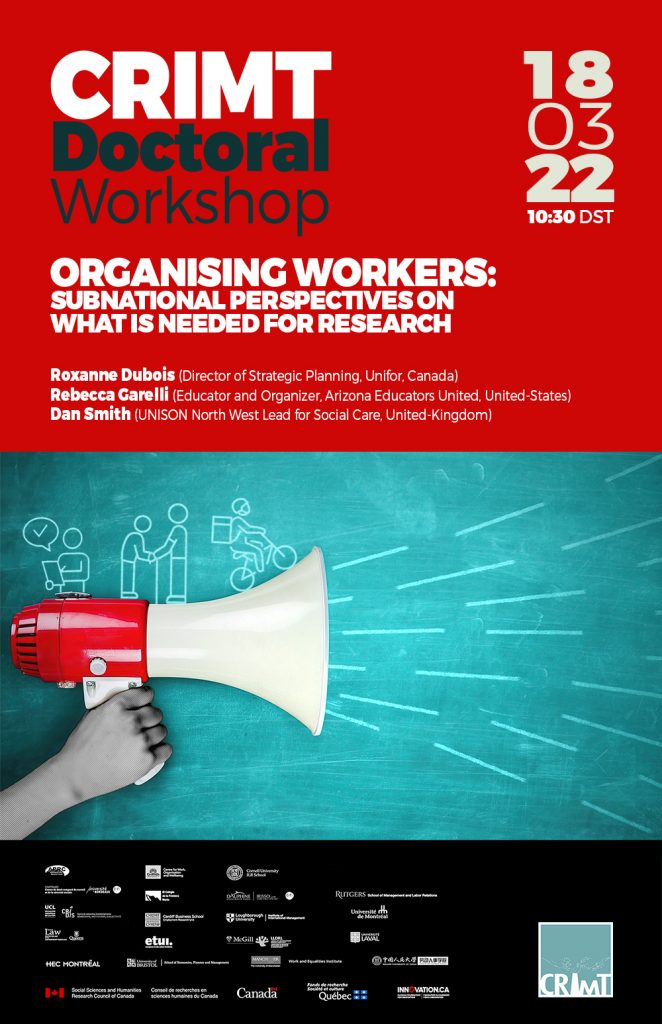
18 March 2022
Roxanne Dubois (Directrice, Planification stratégique, Unifor, Canada), Rebecca Garelli (Educator and Organizer, Arizona Educators United, États-Unis), Dan Smith (UNISON North West Lead of Social Care, Royaume-Uni)
CRIMT Doctoral Workshop
Virtual platform
Organizing Workers: Subnational Perspectives on Research Priorities
This doctoral workshop focused on the type of research that those organizing workers in the care, public education, and digital economy sectors feel is needed, as well as how this research could help support their organizing campaigns, strategic positioning, and negotiation efforts. This activity was developed as a follow-up to the Fall 2021 workshop on academic activism.
The three speakers, coming from different countries and representative bodies, shared their views on the themes and methods most relevant to their situation. For their part, the students had the opportunity to put forward their own concerns and projects, thus establishing a bilateral dialogue with the actors involved in the field.

4 February 2022
Eva Herman (University of Manchester), Geneviève Richard (UQAM), Isabelle Roberge-Maltais (HEC Montréal), Justin Vinton (Rutgers University), Jiyoon Park (Rutgers University), Kai-Hsin Hung (HEC Montréal(
CRIMT Brown Bag Meeting # 1
Virtual platform
Introduction to the 2022 Programming
The purpose of this first 2022 workshop was to: a) provide a brief overview of CRIMT and its Partnership Project; b) introduce the members of the Student Affairs Coordinating Committee and then provide an overview of the 2022 programming; c) allow each student to introduce himself or herself, summarize his or her thesis project, and identify one thing (of any nature) that he or she would like to work on during the year; d) to identify initiatives (e.g., financial, research, personal/mental health) that CRIMT might be able, resources permitting, to support.

20 November 2021
Sheri Davis (Rutgers University), Laurence Derouin-Dubuc (Université de Montréal), Janice Fine (Rutgers University), Ian MacDonald (Université de Montréal), Phela Townsend (Rutgers University)
CRIMT Doctoral Workshop
Virtual platform
Scholar-Activism
This doctoral workshop focused on opportunities, challenges, and resources for the scholar-activist. Scholars of work have over time leveraged different models for scholar-activism including both the scholar-practitioner legacy of industrial relations and the industrial justice focus of labor studies, borrowing in many cases knowingly or unknowingly from canons like the Black Radical Tradition and feminist scholarship.
From interrogating the research questions we ask to analyzing the methods we choose, scholar-activism challenges us to not only be critical of the research process, the political economy of knowledge production, and the industry of academia, but also to articulate our own biases and understand our own socio-structural positionality.
This session explored what it means to be a scholar-activist in 2021, what kind of challenges and opportunities are entailed, and the resources and frameworks that might be useful to researchers interested in the scholar-activist path.
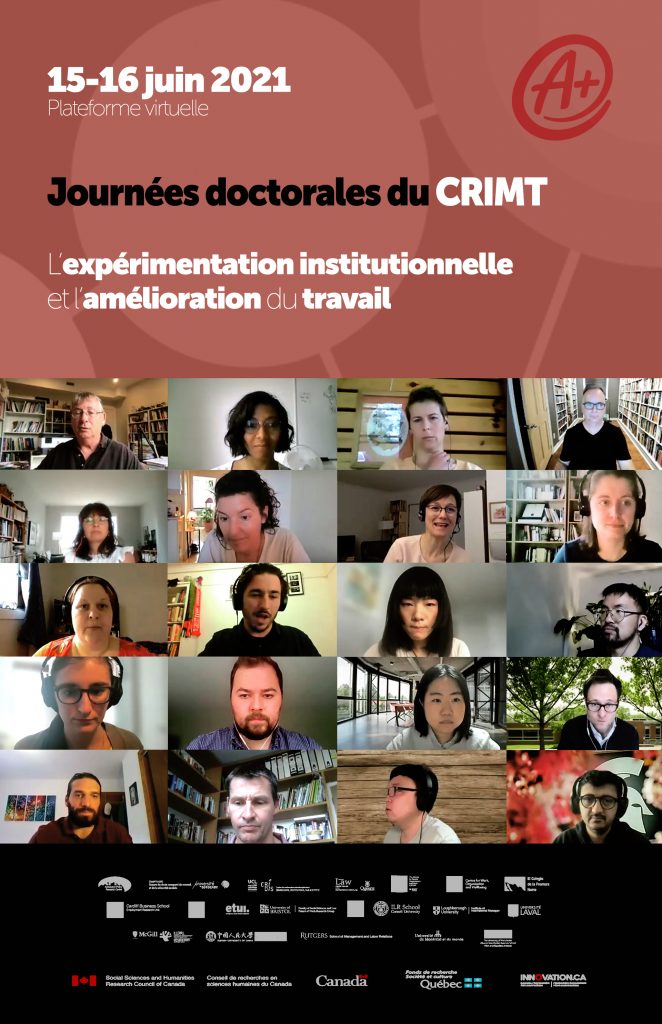
14-15 June 2021
Gregor Murray (Université de Montréal), Blandine Émilien (UQAM), Johanna Weststar (University of Western), Nicolas Roby (Université de Montréal), Sara Perez-Lauzon (HEC Montréal), Julie Garneau (Université Laval), Geneviève Richard (UQAM), Ya Gao (Université de Montréal), Daniel Nicholson (Cardiff University), Kai-Hein Hung (HEC Montréal), Jacob Barnes (Rutgers University), Alysa Hannon (Rutgers University), Seonghoon Hong (Rutgers University), Jiyoon Park (Rutgers University), Phela Townsend (Rutgers University), Justin Vinton (Rutgers University), Tobias Schulze-Cleven (Rutgers University), Tony Edwards (Loughborough University London), Salil Sapre (Michigan State University)
2021 CRIMT Doctoral Days
Virtual platform
Institutional Experimentation for Better Work
After an interruption caused by the Covid-19 pandemic, the year 2021 marks the return of the CRIMT doctoral days. Organised within the framework of the CRIMT Partnership Project, these days are an opportunity for student members to get together (if not virtually), to discuss common challenges or issues and to share their work.
In three workshops over two days, the 2021 event explored the steps involved in hiring processes at North American universities, considered – in collaboration with the Industry 4.0, Work and Employment Axis of the International Observatory on the Societal Impacts of AI and Digital Technology (OBVIA) – the effects of digital technologies on work and our lives, and then glimpsed – in conjunction with Rutgers University’s School of Management and Labor Relations – what the future of work holds for workers (hence, shifting the focus to the future of workers.)

24 March 2021
Karel Musilek (Cardiff Business School)
Workshop on virtual platform
Working Lives Beyond Balance and Encroachment: Form of work/life in coliving
Sociological discussion of working and economic lives has tended to focus on questions of work/life balance and encroachment of work into non-work life. While this research provides useful insights, it has insufficiently reflected the transformation to practices and socio-material arrangements of working lives. Yet, it is within these practices and arrangements where the important extensive demands and intensification of work are accommodated and reproduced.
To start rectifying this lacuna, the author draws on and extend the notion of ‘forms of life’ as a lens through which to conceptualize working lives, how they are shaped and what social practices and arrangements sustain them. He explores this issue through a unique ethnographic study of coliving – a new way of living and novel site of sociological investigation – which seeks to modify domestic and personal lives in lines with demands of extensive and intensive work and ideals of professional and entrepreneurial success.

6 November 2020
Valeria Pulignano (KU Leuven)
Work and Equalities Institute – Tackling contemporary research challenges in uncertain times Postgraduate Researchers’ Virtual Seminar Series
Re-framing your research
Every research project evolves and changes, as new challenges and new questions present themselves, the current pandemic is one such situation. In this online session, students heard from Professor Valeria Pulignano, KU Leuven and CRIMT coresearcher, about her experiences reshaping research projects throughout her career and how she has tackled constraints of researching within the current context in her role as the principal investigator for ResPeTMe a major Horizon 2020 project. This session will also provided an opportunity for PGRs to share some of their concerns and talk through practical solutions on how to re-think their projects within the current context.


17 September 2020
Kate Farhall (CPOW-RMIT), Phela Townsend (SMLR-Rutgers University)
PhD Workshop on virtual platform
Critical Race Theory and Intersectionality in IR
Focusing on CRT (Critical Race Theory) and intersectionality, this workshop was organized by Kate Farhall (CPOW-RMIT) and Phela Townsend (SMLR-Rutgers University). The workshop had four objectives: (1) to share the work and objectives of CRIMT’s CRT/Intersectionality group with the broader student network; (2) to reflect as a group on recent events in the United States and around the world, including the Black Lives Matter movement, and to consider their impact on each of us as individuals and as social scientists; (3) to provide an overview of the journeys and challenges facing students who work or plan to work with CRT in their research will face; and (4) brainstorm and gather feedback on how the CRIMT CRT/Intersectionality group can equip and support students and affiliated researchers who work with CRT and intersectionality and seek to integrate them into their work.

8 August 2020
Peter Morgan (University of Cardiff)
PhD Workshop on virtual platform
Introduction to the ‘R’ programming language
As part of this workshop, Professor Peter Morgan of Cardiff University offered an introductory course on the statistical language “R” to CRIMT student members. Topics covered included loading datasets into R, navigating using some basic commands to summarize and plot data, performing basic statistical procedures, and downloading and installing specialized extensions that add functionality to the platform.
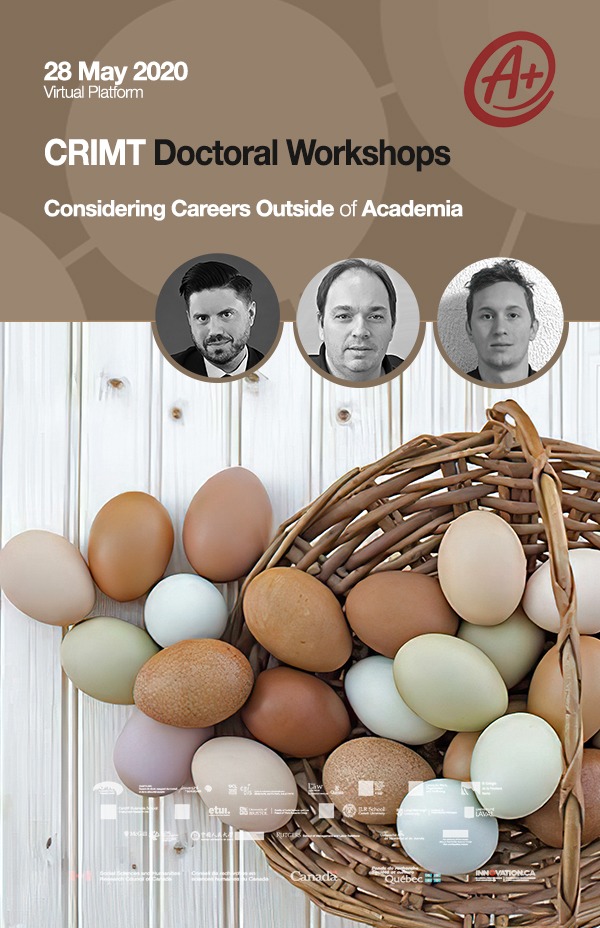
28 May 2020
Adam J. Fowler (Director of research, Beacon Economics, Grand Los Angeles Area), Sylvain Schetagne (Director, Research and Sociopolitical Action and Resident Wellness, Quebec Federation of Resident Physicians), Philippe Scrimger (Research Advisor, Employment and Social Development Canada)
PhD Workshop on virtual platform
Considering Careers Outside of Academia
In our field, doctoral and post-doctoral students often tend to see only one career path: that of academic researcher. The objective of this activity was to introduce students to other career options in the fields of labour and employment, labour law, management and industrial relations. Many former students are now working in a variety of positions in various organizations (unions, government agencies, ministries, research institutes, etc.), and it was important to hear the views of those who have successfully pursued other career paths. Moreover, given the unique challenges posed by the Covid-19 pandemic, we thought it would be appropriate to highlight the work of colleagues who are placing their research skills at the service of politics, government and public health.

22 May 2020
Sabrina Ruta (Senior Manager and Team Leader, Canada Revenue Agency), Martine Poulin (Director, Prevention of OHS problems and rehabilitation, Institut de recherche Robert-Sauvé en santé et sécurité du travail), Carol-Anne Gauthier (CEGEP Champlain St. Lawrence/ Université Laval)
PhD Workshop on virtual platform (held in French)
Faire carrière en dehors du milieu universitaire
In our field, doctoral and post-doctoral students often tend to see only one career path: that of academic researcher. The objective of this activity was to introduce students to other career options in the fields of labour and employment, labour law, management and industrial relations. Many former students are now working in a variety of positions in various organizations (unions, government agencies, ministries, research institutes, etc.), and it was important to hear the views of those who have successfully pursued other career paths. Moreover, given the unique challenges posed by the Covid-19 pandemic, we thought it would be appropriate to highlight the work of colleagues who are placing their research skills at the service of politics, government and public health.

24 October 2019
Maite Tapia (Michigan State University), Olivier Jégou (UCLouvain), Isabelle Hudon (Université Laval), Matthew Fischer-Daly (Cornell University), Sari Madi (Université de Montréal)
CRIMT Doctoral School 2019
Hôtel Chéribourg, Magog
Institutional Experimentation for Better Work
Held once a year, CRIMT’s Doctoral School offers a unique exchange forum to its student members. During a one-day workshop, students address a series of theoretical and methodological issues related to their studies and, more broadly, to the doctoral program.
The program for the 2019 edition of the Doctoral School included a “speed dating” session to get to know each other better, a workshop on the case presentation template, where students were invited to share their thoughts on the template and discuss how to improve it, followed by a session on the concept of intersectionality and its usefulness in industrial relations research.

8 May 2019
Francine Jacques (Université Laval), Sean O’Brady (McMaster University), Nicolas Roby (Université de Montréal), Émilie Lessard-Mercier (Université Laval), Phela Townsend (Rutgers University), Kate Farhall (RMIT), Jeff Lane (Rutgers University), Tamara Lee (Rutgers University), Sheba Tejani (The New School)
CRIMT Doctoral Day 2019
Université de Montréal, Montreal
Institutional Experimentation for Better Work
Held once a year, CRIMT’s Doctoral Day offers a unique exchange forum to its student members. During a one-day workshop, students address a series of theoretical and methodological issues related to their studies and, more broadly, to the doctoral program.
The program for the 2019 edition of the Doctoral Day included a session on what constitutes a good scholarship or grant application, a workshop on strengthening CRIMT’s doctoral student community and a session with Jeff Lane (Rutgers University), Tamara Lee (SMLR-Rutgers University) and Sheba Tejani (The New School) on the concept of intersectionality and its usefulness in industrial relations research.

13 November 2018
Amanda Coles (Deakin University), Émilie Genin (Université de Montréal)
Graduate Research Methods Policy Analysis Workshop
Université de Montréal, Canada
Experimenting for Equality: What’s the Problem Represented to Be? Or WPR approach
As a graduate training and professional development opportunity tied to the Experimenting For Equality: An International Policy Summit on Gender Equality in Global Screen Industries, CRIMT researchers Amanda Coles (Deakin University) and Emilie Genin (Université de Montréal) offered a one-day policy analysis workshop for graduate students. The interactive, student-facing research workshop covered the theoretical foundations of Bacchi’s ‘What’s the problem represented to be?’ (WPR) conceptual framework and methodological approaches for WPR policy analysis. It involved a generalised review of policy objects and agents, as well as systematic approaches to analysing policy discourses. Students worked with examples from the summit pre-briefing documents as the foundational training materials. The workshop also involved student-led discussions about how this approach could be of use in their own current or future research projects across a range of research areas, and how WPR complements and/or challenges other policy research paradigms.

24 October 2018
Adelheid Hege (Institut de Recherches Économiques et Sociales), Christian Dufour (CRIMT), Amanda Coles (Deakin University), Urwana Coiquaud (HEC Montréal), Chloé Fortin-Bergeron (UQTR), Johanna Weststar (University of Western), Charlotte Yates (University of Guelph), Nicolas Roby (CRIMT – Université de Montréal)
CRIMT Doctoral School 2018
Hôtel Manoir-des-Sables, Magog
Institutional Experimentation for Better Work
Held once a year, CRIMT’s Doctoral School offers a unique exchange forum to its student members. During a one-day workshop, students address a series of theoretical and methodological issues related to their studies and, more broadly, to the doctoral program.
The program for the School’s 2018 Edition included a session on qualitative research interviews, a workshop on hiring processes in academia, a session on using CRIMT’s research partnership technology platform, and a call to action on intersectionality and its potential in research.

15 May 2018
Julie Garneau (Université Laval), Laurence Derouin-Dubuc (Université de Montréal), Isabelle Hudon (Université Laval), Lucie Morissette (HEC Montréal), François Bolduc (Université Laval), Sara Perez-Lauzon (HEC Montréal), Sébastien Parent (Université de Montréal), Sari Madi (Université de Montréal), Sondes Turki (Université de Montréal), Dalia Gesualdi-Fecteau (UQAM), Julien Gobeil-Proulx (Université Laval)
CRIMT Doctoral Day 2018
Université de Montréal, Montreal
Institutional Experimentation for Better Work
Held once a year, CRIMT’s Doctoral Day offers a unique exchange forum to its student members. During a one-day workshop, students address a series of theoretical and methodological issues related to their studies and, more broadly, to the doctoral program.
The program for the 2018 edition of the Doctoral day included a session on CRIMT’s new research partnership platform, two case presentation workshops and a session on how to give punch to conference presentations with Julien Gobeil-Proulx, Pedagogy and Technopedagogy Advisor, Centre de services en TI et en pédagogie (CSTIP), Université Laval.

26 October 2017
Isabelle Ferreras (TED-CriDIS – UCLouvain), Valeria Pulignano (UK Leuven), Louise Boivin (UQO), Amanda Coles (Deakin University), Kate Farhall (CPOW – RMIT), Georgina Murray (WOW – Griffith University), David Peetz (WOW – Griffith University), Blandine Émilien (UQAM), Nicolas Roby (CRIMT – Université de Montréal)
CRIMT Doctoral School 2017
Hôtel Manoir-des-Sables, Magog
Institutional Experimentation for Better Work
Held once a year, CRIMT’s Doctoral School offers a unique exchange forum to its student members. During a one-day workshop, students address a series of theoretical and methodological issues related to their studies and, more broadly, to the doctoral program.
The program for the School’s 2017 Edition included a session on the notion of experimentation and its usefulness as an interpretative framework, a workshop on improving work with respect to gender gaps: parameters for gender mainstreaming in studies on institutional experimentation and its potential for better work, and a session on a particular institutional experimentation scenario: Governing capitalism through economic bicameralism.

23 May 2017
Nicolas Roby (Université de Montréal), Julie Garneau (Université Laval), Laurence Derouin-Dubuc (Université de Montréal), Mouhamadou Sanni Yaya (HEC Montréal), Lucie Morissette (HEC Montréal), Raoul Gebert (CRIMT), Marie Van den Broeck (HEC Montréal), Sondes Turki (Université de Montréal), Yves Blanchet (Université de Montréal), Sean O’Brady (McMaster University), Catherine Le Capitaine (Université de Montréal), Blandine Émilien (HEC Montréal), Mathieu Dupuis (TÉLUQ), Xiaoming Bao (Université de Montréal), Marie-Pier Bernard (Université Laval), Salima Kamoun (Université Laval), Charles Tremblay-Potvin (Université Laval), François Bolduc (Université Laval), Gilles Trudeau (Université de Montréal), Phil Almond (Leicester University), Martine D’Amours (Université Laval), Renée-Claude Drouin (Université de Montréal)
CRIMT Doctoral Day 2017
HEC Montréal, Montreal
Institutional Experimentation for Better Work
On the occasion of this Doctoral Day, students funded by CRIMT’s Dissemination Fund were invited to rehearse their presentation in front of their fellow doctoral students. A sort of ‘mock session’ (simulation sessions) that English-speaking students are fond of (but which we are not really used to organizing in Quebec), this activity allowed students to test their ideas and refine their presentation (in light of their colleagues’ constructive suggestions); on the Centre’s side, this Day allowed us to reinforce team spirit, as well as to leverage the effect of our student funding programs. The presentations were grouped into three thematic sessions: changes in the forms of economic organizations and labor regulatory institutions: sectoral and territorial perspectives; the agility of actors with regard to institutional embedding: the case of globalized managers, mutual training and social risk management and union life, representation and democratic governance.
The Day concluded with a session on the publication of scientific articles (for many, the logical continuation of their participation in a conference or congress). We asked a number of fellow professors who are journal editors (Phil Almond, Associate Editor of the International Journal of Human Resource Management, Martine D’Amours, Editor of Relations Industrielles / Industrial Relations and Renée-Claude Drouin, former member of the Quebec Editorial Board of the Canadian Labour & Employment Law Journal) to lead this session, under the chairmanship of Gilles Trudeau (Université de Montréal).
